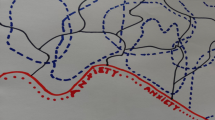Abstract
This chapter considers Alfred Schutz’s notion of “anxiety” to analyze phenomenologically the disturbing experience of living in a crisis-shaped present, showing how the ongoing restructuration of societies by globalized capitalist activity generates unintended consequences, which are disclosed as irreversible threats to life on Earth. The resulting crisis constellation impacts on the whole biosphere and permeates our affective environment. The focus then turns to the work of affect theorist Lauren Berlant to concentrate upon the unfolding of event as an “impasse” that opens out into anxiety. Particular attention is given to the role of common-sense assumptions in relation to the “relevance” structures which guide the subject’s expectations and commitments in life. I conclude by revisiting contrasting views on anxiety and the “fear of death,” considered more as a problem of time-consciousness than an existentialist predicament, and undertaken more as a “shared readiness” to transcend the boundaries of former assumptions than a lonely awareness of the eventuality of one’s mortality.
Access this chapter
Tax calculation will be finalised at checkout
Purchases are for personal use only
Similar content being viewed by others
References
Archer, Margaret. 2007. Making Our Way through the World: Human Reflexivity and Social Mobility. Cambridge: Cambridge University Press.
Barber, Michael. 1988. Social Typifications and the Elusive Other: The Place of Sociology of Knowledge in Alfred Schutz’s Phenomenology. London: Associated University Press.
Beck, Ulrich. 1992. Risk Society: Towards a New Modernity. London: SAGE.
Berger, Peter, and Thomas Luckmann. 1966. The Social Construction of Reality: A Treatise in the Sociology of Knowledge. New York: Penguin Books.
Berlant, Lauren Gail. 2012. Cruel Optimism. Durham: Duke University Press.
Carr, David. 1991. Time, Narrative, and History. Bloomington: Indiana University Press.
Clough, Patricia T. 2007. Introduction. In The Affective Turn: Theorizing the Social, ed. Patricia T. Clough and Jean Halley, 1–33. Durham: Duke University Press.
Elias, Norbert. 1978. What Is Sociology? London: Hutchinson.
Giddens, Anthony. 1990. The Consequences of Modernity. Cambridge: Polity.
———. 1991. Modernity and Self-Identity: Self and Society in the Late Modern Age. Stanford: Stanford University Press.
Gould, Deborah B. 2009. Moving Politics: Emotion and ACT UP’s Fight Against AIDS. Chicago: The University of Chicago Press.
Husserl, Edmund. 1970. The Crisis of European Sciences and Transcendental Phenomenology: An Introduction to Phenomenological Philosophy, Northwestern University Studies in Phenomenology & Existential Philosophy. Evanston: Northwestern University Press.
———. 1973. Experience and Judgment: Investigations in a Genealogy of Logic. London: Routledge and K. Paul.
———. 1982. Ideas Pertaining to a Pure Phenomenology and to a Phenomenological Philosophy. First Book: General Introduction to a Pure Phenomenology. The Hague: Martinus Nijhoff.
Kemple, Thomas. 2019. Simmel’s Sense of Adventure: Death and Old Age in Philosophy Art and Everyday Life. The Germanic Review: Literature, Culture, Theory 94(2) 163-174.
Knoblauch, Hubert. 2014. Projection, Imagination, and Novelty: Towards a Theory of Creative Action Based on Schutz. In The Interrelation of Phenomenology, Social Sciences and the Arts, ed. Michael Barber and Jochen Dreher, 31–49. Dordrecht: Springer.
Knoblauch, Hubert, and Martina Löw. 2020a. The Re-figuration of Spaces and Refigured Modernity – Concept and Diagnosis. Historical Social Research 45 (2): 263–292.
———. 2020b. “Dichotopia – The Refiguration of Spaces and the Security Society in Times of the Corona Risk.” Re-figurations of Spaces Collaborative Research Center Blog/Coronavirus Edition #1 (blog). April 2020. https://sfb1265.de/en/blog/dichotopia-the-refiguration-of-spaces-and-the-security-society-in-times-of-the-corona-risk/.
Lafontaine, Simon. 2020. The Significance of Mobility in Alfred Schutz’s Theory of Action. Human Studies 43(4) 567-584.
Lafontaine, Simon. 2022. Adventure in the Social World: Georg Simmel’s Appeal to a Theory of Creative Action. Journal of Classical Sociology 00(0) 1-22 (Online First).
Lash, Scott. 2003. Reflexivity as Non-Linearity. Theory, Culture & Society 20 (2): 49–57.
Latour, Bruno. 2005. Re-Assembling the Social: An Introduction to Actor-Network Theory. Oxford: Oxford University Press.
Macón, Cecilia. 2013. Sentimus ergo sumus, El surgimiento del ‘giro afectivo’ y su impacto en la filosofía política. Revista Latinoamericana de Filosofía Política 2 (6): 1–32.
Mouzelis, Nicos P. 2008. Modern and Postmodern Social Theorizing: Bridging the Divide. Cambridge/New York: Cambridge University Press.
Schutz, Alfred. 1962a. Choosing Among Projects of Action. In Collected Papers I. The Problem of Social Reality, ed. Maurice Natanson, 67–96. The Hague: Martinus Nijhoff.
———. 1962b. Common-Sense and Scientific Interpretation of Human Action. In Collected Papers I. The Problem of Social Reality, ed. Maurice Natanson, 3–47. The Hague: Martinus Nijhoff.
———. 1962c. On Multiple Realities. In Collected Papers I. The Problem of Social Reality, ed. Maurice Natanson, 207–259. The Hague: Martinus Nijhoff.
Silver, Daniel. 2011. The Moodiness of Action. Sociological Theory 29 (3): 199–222.
Sloterdijk, Peter. 2016. Foams: Spheres. Vol. 3: Plural Spherology. Los Angeles: Semiotext(e).
Strassheim, Jan. 2016. The Problem of ‘Experiencing Transcendence’ in Symbols, Everyday Language and Other Persons. Schutzian Research 8: 75–101.
Author information
Authors and Affiliations
Editor information
Editors and Affiliations
Rights and permissions
Copyright information
© 2022 The Author(s), under exclusive license to Springer Nature Switzerland AG
About this chapter
Cite this chapter
Lafontaine, S. (2022). Anxiety and the Re-figuration of Action: Living in a Crisis-Shaped Present. In: Vakoch, D.A., Mickey, S. (eds) Eco-Anxiety and Planetary Hope. Springer, Cham. https://doi.org/10.1007/978-3-031-08431-7_4
Download citation
DOI: https://doi.org/10.1007/978-3-031-08431-7_4
Published:
Publisher Name: Springer, Cham
Print ISBN: 978-3-031-08430-0
Online ISBN: 978-3-031-08431-7
eBook Packages: Behavioral Science and PsychologyBehavioral Science and Psychology (R0)




